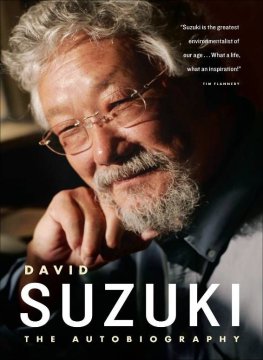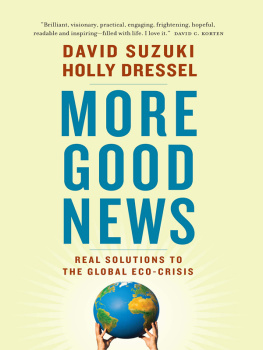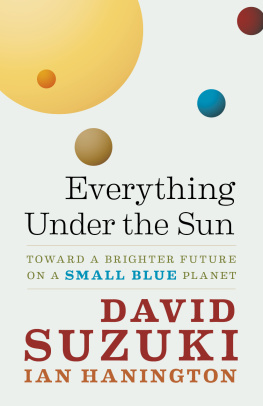GOOD NEWS FOR A CHANGE
HOW EVERYDAY PEOPLE ARE HELPING THE PLANET
DAVID SUZUKI
HOLLY DRESSEL
GREYSTONE BOOKS
Douglas & McIntyre Publishing Group
Vancouver/Toronto/New York

Copyright 2002 by David Suzuki and Holly Dressel
First paperback edition 2003
07 08 09 10 11 10 9 8 7 6
All rights reserved. No part of this book may be reproduced, stored in a retrieval system or transmitted, in any form or by any means, without the prior written consent of the publisher or a license from the Canadian Copyright Licensing Agency (Access Copyright). For a copyright license, visit www.accesscopyright.ca or call toll free to 1-800-893-5777.
Greystone Books
A division of Douglas & McIntyre Ltd.
2323 Quebec Street, Suite 201
Vancouver, British Columbia
Canada V5T 4S7
www.greystonebooks.com
David Suzuki Foundation
2211 West 4th Avenue, Suite 219
Vancouver, British Columbia
Canada V6K 4S2
First published in 2002 by Stoddart Publishing Co. Limited, Toronto, Ontario
National Library of Canada Cataloguing in Publication Data
Suzuki, David, 1936
Good news for a change: how everyday people are helping the planet/David Suzuki and Holly Dressel.
Co-published by: David Suzuki Foundation.
Includes bibliographical references and index.
Previous ed. has title: Good news for a change: hope for a troubled planet.
ISBN-13 978-1-55054-926-3 ISBN-10 1-55054-926-X
1. Environmentalism. 2. Environmental degradation. 3 Sustainable development. I. Dressel, Holly Jewell. II. David Suzuki Foundation. III. Title. GF75.S993 2003 363.7 C2003-910055-3
Library of Congress information is available.
Cover design by Bill Douglas @ The Bang
Text design and typesetting by Tannice Goddard, Soul Oasis Networking
Printed and bound in Canada by Friesens
Distributed in the U.S. by Publishers Group West
Greystone Books is committed to reducing the consumption of old-growth forests in the books it publishes. This book is one step towards that goal. It is printed on acid-free paper that is 100% ancient-forest-free, and it has been processed chlorine-free.
We gratefully acknowledge the financial support of the Canada Council for the Arts, the British Columbia Arts Council, and the Government of Canada through the Book Publishing Industry Development Program (BPIDP) for our publishing activities.
To our grandchildren:
Tamo Campos, Midori Campos, Jonathan Suzuki-Cook and Parker Toole
ACKNOWLEDGMENTS
As usual with such efforts, so many people helped us that we cannot thank them all. We have had to single out those who have worked above and beyond the call of duty. Besides Davids secretary, Lisa Hayden, who provided a consistently cheerful link between the authors, we want to thank Joel Silverstein for transcribing tapes that were often poorly recorded because of difficult field conditions. We would also like to thank Angel Guerra, Jennifer Glossop, Jim Gifford and Jane McWhinney for the many extra duties they performed and for their sincere interest in making this a better book. Christine and Ernst von Weizsacker provided warm hospitality as well as much-needed rest and advice in the middle of Hollys travels. Vandana Shiva and Elizabeth May gave enormous amounts of their time and encouragement, as did David and Fran Korten. We are truly in the debt of Dick and Jeanne Roy, who so unselfishly helped with research around the Pacific Northwest. We wish to acknowledge Beth Burrows and Helmut Meyer, who were unfailing in providing fast information about agricultural, scientific and justice issues. Holly was particularly inspired by Jerry Mander, and also wishes to express her gratitude for the honest critiques provided by Jim Latteier.
We regret not being able to use many of the wonderful stories provided to us, especially those shared by Mike Green and Fred Gallagher. Gerry Scott, Roberta Martell and Tara Cullis of the DSF generously gave of their time to help us with several issues. We very much want to thank the many readers of our last book, From Naked Ape to Superspecies, which became a bestseller, for making this book possible. We would like to thank our children, and we especially thank our grandchildren for being the physical reminders of why each generation needs to work so hard to prepare and conserve the world for the next.
INTRODUCTION
So Whats the Good News?
The Revolutions Here
Until we have a reasonable idea of where we want to go, we are unlikely to get there.
DAVID KORTEN, THE POST-CORPORATE WORLD
We, the authors of this book, have been involved in environmental battles for decades. Both of us have often viewed the escalating environmental crisis as a kind of war. As in a war, there have been defeats and victories. Weve witnessed ecological and social atrocities, but weve also had the privilege of working with people who are among the most creative and courageous on earth. Many moments have come when we found it difficult to envision a time of peace. In our efforts to save this forest or that species, we sometimes lost sight of the real goal resolution and balance. So we decided wed written enough about contentious opposition. It was time to do a book about dynamic equilibrium; we needed to determine whether there existed practical ways by which humans could support themselves without despoiling the planet.
Once we began to look into it, we made some astonishing discoveries about ourselves as well as about the world. For example, we now realize that we shared a common attitude: that fighting for the environment is self-sacrificing and austere, and that concerned people have to don the hair shirt of discipline and control in order to conserve and protect the natural systems around us. To save the planet we would have to give up things like eating meat, drinking coffee or taking trips. In short, we believed that having cleaner air and water and preserving our plants, soils and animal species meant human lives would have to be less fun, with fewer opportunities for personal satisfaction. Only as we began to research this book did we comprehend that we had it all wrong.
As seasoned activists, we had also thought we were somehow immune to a pernicious philosophy underlying our modern culture, which implies that the fulfillment of personal, individual desire is the basis of human happiness; that life on this planet would be unbearable without an escalating level of material comforts; and that self-indulgence and self-realization are the same thing. In fact, we had completely internalized these cultural teachings. The process of trying to find workable solutions to the fundamental environmental and social problems facing the world today forced us to step back and question our personal assumptions about life. We met people striving to find solutions, and as they talked about the way they lived and their most fundamental visions for the future, we had to reflect on what had brought each of us the most personal happiness in the past. This exercise made us realize that, beyond very basic levels, our separate experiences of satisfaction, contentment and joy had very little to do with material consumption and comforts. They had more to do with connecting with others, with feeling useful and, amazingly enough, with sharing everything from food and feelings to ideas and beliefs.
If were pretty typical of most humans, and sharing, connecting and being useful are what really make us happy, how did we fall so deeply for a culture that tells us that selling our lifes labor for fancy toys like SUVs and airplane rides, enormous houses, clothes, drugs, cosmetics, and enough food to make a majority of us actually obese, will bring joy and fulfillment? Many books have analyzed the relatively innocent way our current economic dogma, often expressed by the terms globalization or neo-liberalism, developed after the Great Depression. It was designed to enlarge and spread wealth by increasing consumer desires and therefore industrial productivity and employment. But it has gradually turned into a tool used by groups of the already wealthy to subdue and plunder every natural resource and every human culture left on the planet. Those who need this historical background will find some of the best resources on the subject in the bibliography at the end of this book.








